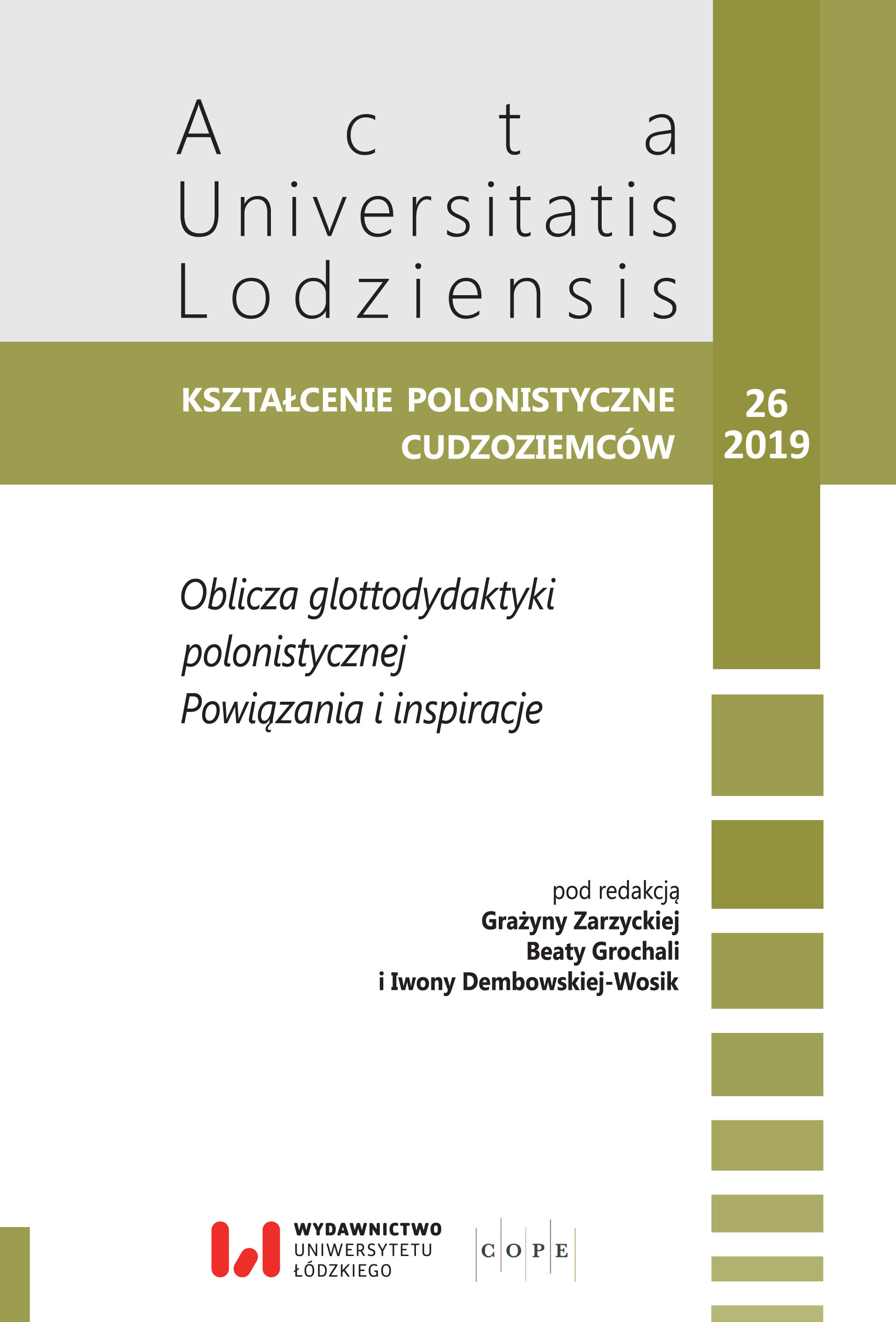Prepositional phrases and their lexicographical description in German and German-Polish dictionaries – glottodidactic perspective
DOI:
https://doi.org/10.18778/0860-6587.26.24Keywords:
temporal prepositional phrases, collocations, equivalence, contextual partner, survey, academic didacticAbstract
The subject of the analysis are temporal prepositional phrases, i.e. typical, usually binary lexical sets which have the status of collocations and consist of a preposition and a noun, e.g. auf Dauer, auf die Dauer, bei längerer Dauer. The established connectivity of such collocations, which are conditioned grammatically and functionally, is one of the biggest linguistic problems in teaching German as a non-native language. In the article, we analyze the presence of selected prepositional syntagmas in general and bilingual dictionaries and in the National Corpus of the Czech Language, alongside the results of a survey study. Moreover, we propose an exemplary dictionary entry for prepositional phrases for a forthcoming German-Polish dictionary of collocations and we discuss the issue of equivalence of the analyzed phrases.
References
Bahns J., 1993, Word Partnerships – Kollokationsübungen für die Wortschatzarbeit, „Zielsprache Englisch“, z. 13, s. 7–12.
Google Scholar
Bahns J.,1996, Kollokationen als lexikographisches Problem: Eine Analyse allgemeiner und spezieller Lernerwörterbücher des Englischen, Tübingen.
Google Scholar
Barlow M., 2004, Software for Corpus Access and Analysis, w: J. Sinclair (red.), How to Use Corpora in Language Teaching, Amsterdam–Philadelphia, s. 205–221.
Google Scholar
Brdar-Szabó R., 2010, Nutzen und Grenzen der kontrastiven Analyse für Deutsch als Fremd- und Zweitsprache, w: H. J. Krumm, Ch. Fandrych, B. Hufeisen, C. Riemer (red.), Deutsch als Fremd- und Zweitsprache. Ein internationales Hanbuch. Bd 1. (Handbooks of linguistics and communications science; 35.1/35.2). Berlin–New York, s. 518–531.
Google Scholar
Burkhardt H., Jurasz A., 2013, Koncepcja metodologiczno-leksykograficzna słownika kolokacji niemiecko-polskich, w: J. Mazur, A. Małyska, K. Sobstyl (red.), Glottodydaktyka polonistyczna w obliczu dynamiki zmian językowo-kulturowych i potrzeb społecznych, Lublin, t. 2, s. 39–46.
Google Scholar
Burkhardt H., Jurasz A., 2016, Zu einigen Problemen der Darstellung von Kollokationen im deutschpolnischen Kollokationswörterbuch, w: I. Bartoszewicz i in. (red.), Sprachen und Kulturen im Kontakt (7), Wrocław–Dresden, s. 37–49.
Google Scholar
Dinsel S., 2006, Präpositionen, Ismaning.
Google Scholar
Engel U. i in., 1999, Deutsch-polnische kontrastive Grammatik, Heidelberg, t. 1.
Google Scholar
Hausmann F. J., 1984, Wortschatzlernen ist Kollokationenlernen. Zum Lehren und Lernen französischer Wortverbindungen, „Praxis des neusprachlichen Unterrichts“, t. 31, s. 395–406.
Google Scholar
Konecny Ch., 2010, Von ‘hinkenden’ Stühlen, ‘tanzenden’ Zähnen und ‘verlorenen’ Verkehrsmitteln. Erfassung und Darstellung italienischer lexikalischer Kollokationen für deutschsprachige L2-Lerner (auf der Grundlage des „Dizionario di base della lingua italiana – DIB“), w: A. Dykstra, T. Schoonheim (red.), Proceedings of the XIV. Euralex International Congress, Leeuwarden, s. 1207–1221.
Google Scholar
Reder A., 2006, Kollokationen in der Wortschatzarbeit, Wien.
Google Scholar
Steyer K., 1998, Kollokationen als zentrales Übersetzungsproblem – Vorschläge für eine Kollokationsdatenbank Deutsch-Französisch / Französisch-Deutsch auf der Basis paralleler und vergleichbarer Korpora, w: D. Bresson (red.), Lexikologie und Lexikographie Deutsch- Französisch. (=Cahiers d´Études Germanique 35), Aix-en-Provence: Université Lumière, s. 95–113.
Google Scholar
Steyer K., 2008, Kollokationen in deutschen Wörterbüchern und in der deutschen Wörterbuchforschung, „Lexicographica“, t. 24, Tübingen: Niemeyer, s. 185–207.
Google Scholar
Steyer K., Hein K., 2018, Usuelle satzwertige Wortverbindungen und gebrauchsbasierte Muster, w: S. Engelberg i in. (red.), Wortschätze, Dynamik, Muster, Komplexität, „Jahrbuch des Instituts für Deutsche Sprache“, s. 107–129.
Google Scholar
Taragońska J., 2016, Zur Erfassung der Kollokationen in Vokabeltaschenbüchern und Vokabelheften für DaF-Lernende, „Prace Językoznawcze“, t. XVIII, nr 4, s. 145–172.
Google Scholar
Chodera J., Kubica S., Bzdęga A., 2007, Podręczny słownik niemiecko-polski, Warszawa, wyd. XIX.
Google Scholar
Czochralski J., Ludwig K. D., 1999, Słownik frazeologiczny niemiecko-polski, Warszawa.
Google Scholar
Duden 11, 2002, Duden – Redewendungen: Wörterbuch der deutschen Idiomatik, Mannheim, 12 t.
Google Scholar
Duden, 2011, Deutsches Universalwörterbuch, Mannheim-Zürich 2011, wyd. 7.
Google Scholar
DWDS [online], https://www.dwds.de/wb/wdg, [28.08.2019].
Google Scholar
Hueber Wörterbuch, 2012, Deutsch als Fremdsprache. Słownik niemiecko–polski, polsko–niemiecki dla uczących się języka niemieckiego, Ismaning, wyd. 3.
Google Scholar
Kempcke G., 2000, Wörterbuch Deutsch als Fremdsprache, Berlin–New York.
Google Scholar
Langenscheidt, 2014, Praktisches Wörterbuch polnisch-deutsch deutsch-polnisch, München–Wien.
Google Scholar
Piprek J., Ippoldt J., 1980, Wielki słownik niemiecko-polski, Warszawa, t. 1 z suplementem, wyd. IV.
Google Scholar
PONS, 2007, Wielki słownik niemiecko-polski, Poznań.
Google Scholar
Rytel-Schwarz D., 2012, Taschenwörterbuch Polnisch, Polnisch-Deutsch, Deutsch-Polnisch, Hildesheim–Zürich–New York.
Google Scholar
Wahrig G. (red.), 1981, Deutsches Wörterbuch in sechs Bänden, Wiesbaden–Stuttgart.
Google Scholar
Wiktorowicz J., Frączek A. (red.), Wielki słownik niemiecko-polski, Warszawa. DWDS, https://www.dwds.de/ [28.08.2019].
Google Scholar
Český národní korpus, https://www.korpus.cz/ [28.08.2019].
Google Scholar
Narodowy korpus języka polskiego, http://nkjp.pl/ [28.08.2019].
Google Scholar
Downloads
Published
How to Cite
Issue
Section
License

This work is licensed under a Creative Commons Attribution-NonCommercial-NoDerivatives 4.0 International License.










